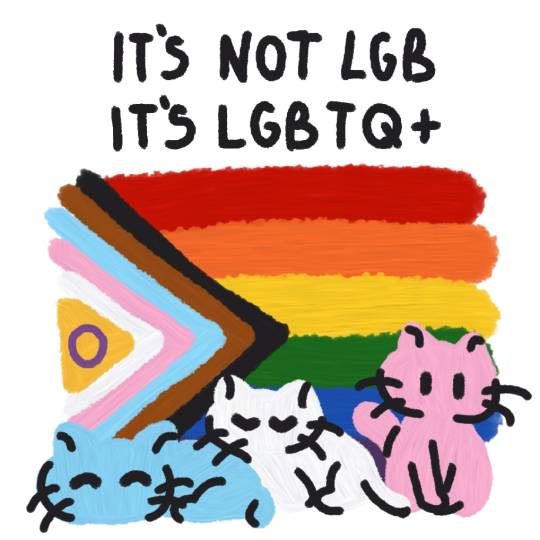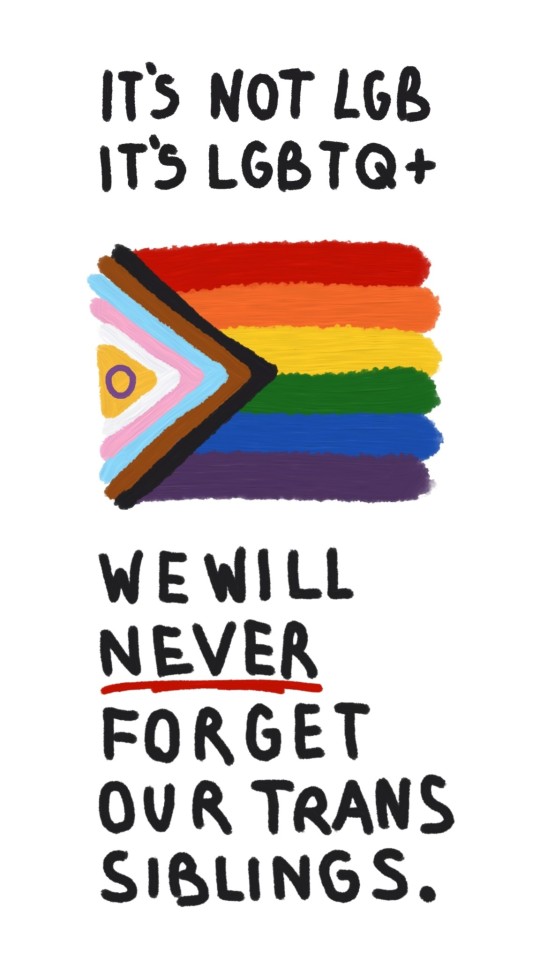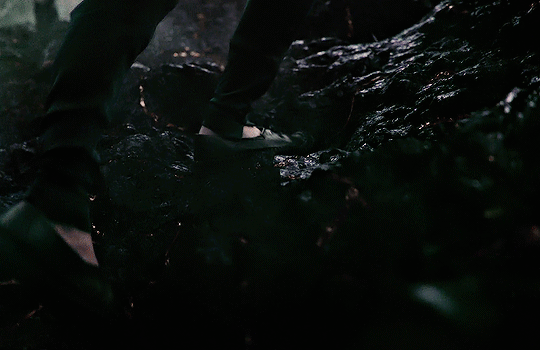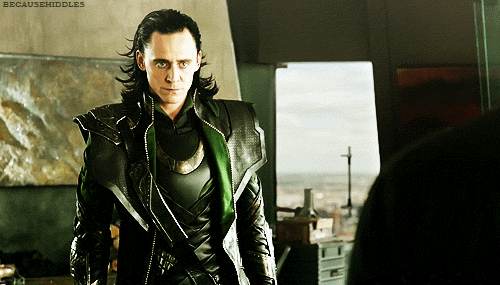Text
What is a knight without his princess; his purpose?


hi have more doomed zelink au(?) stuff :) (continuation of this)
bonus: (totk ending spoilers!)


5K notes
·
View notes
Text
In regards of the Trump government scraping all trans inclusion in its queer information portion of its websites I have made this thing. Spread the word. Don't let them pretend we never existed.



P.S: Don't like! Reblog! <3
EDIT: Well this got a lot of attention! I got a few users asking to print or repost my art and I am unimaginably grateful to everyone's interest, especially since it's a really simple drawing I made on a whim haha! Anyone who is looking to print these out to hang or hand out or repost on another platform is free to do so, although I ask you to credit me and let people know it's from my Tumblr profile! If anyone wishes to do anything else with my art or post and wants to clarify what I consent to then they can message me privately and I'll explain! <333 all my love to my queer siblings
EDIT: I made an LGBTQIA+ version with a focus on trans and intersex folks, it's on my pinned if you prefer this version of the acronym.
107K notes
·
View notes
Text
not to be anti-religious but i do wonder if teaching children that they are innately flawed and sinful is, perhaps, not a healthy worldvi
22K notes
·
View notes
Text
We are a very very dumb, stupid people
62K notes
·
View notes
Note
I’ll be 18 in September and I’m petrified.
You're 17 and 4/5ths right now, you're not aging up a full year, you're just gonna be a few months older than you are right now. Time moves on, the numbers keep going up, the numbers are meaningless.
22K notes
·
View notes
Text
How can I get funnier when I cannot find it?
you guys have GOT to get funnier. get funnier
2K notes
·
View notes
Text
LET'S TALK ABOUT LOKI'S SHOES (ACTUALLY, HIS WHOLE WARDROBE)

Production costs aside, clothes tell the audience about how characters think of themselves.
Loki's shoes in the S2 finale raised a lot eyebrows, but I find them quite fitting: they are comfortable, practical, and most importantly, they are humble. The camera brings this to our attention to communicate his evolution in character.


Loki has always dressed well, often times ostentatiously. Whether he is at war, passing as a Midgardian, or held captive as an Asgardian prisoner, Loki communicates his social class and sense of superiority through clothing. For him, clothing armors his fragile sense of self and against others' opinions of him. He intends to be perceived as deadly charming but ultimately unapproachable.

His attire in the first Thor movie is roughly equal parts green and gold, signifying his royal status. His style is dressed down for his brother's misadventures in Jotenheim, yet overall both silhouettes are lofty, princely, but not hardened or threatening.

In Avengers, Loki's look has more black and leather, with exaggerated emphasis on his shoulders meant to intimidate as he assumes the role of villain. The silhouette is very hard, heavy, and edgy. Gold detailing is prevalent as well. Combined with the goat's helm, this is Loki's most pretentious outfit, which speaks to an undercurrent of low self-esteem and a compulsive need to impress. There's no mistaking he is the main antagonist of the story.

In Thor 2, Loki's attire is similar to Avengers but the overcoat is exchanged for a less bulky version (perhaps conveying he is less guarded now that the effects of the Mind Stone are no longer influencing him). Loki's role likewise pivots from the harsh lines of a villain to the more flexible edges of a reluctant villain-turned-ally. This aligns with his character arc when he protects both Jane and Thor, seemingly sacrificing himself.

In Thor 3, Loki's silhouette is streamlined even further. The overcoat is done away with in favor of what appears to be a leather doublet, pauldrons, and vambraces. Gold accents are minimal. While stylish, Loki's attire is more practical than showy, and his helm serves the dual purpose of protection as well as weaponry. At this point in his arc, Loki has become a full antihero, joining his brother's side in rescuing as many Asgardians as possible, and eventually dying in a vain bid to protect Thor from Thanos.

The TVA does something very fun and interesting in taking away Loki's ability to dress himself. Since Loki cannot use his magic in the TVA, he is forced to wear the same clothing as his captor/advocate, who eventually becomes his best friend and peer.

Perhaps, on a subconscious level, this helped Loki to feel included. We know by his pwn admission that Loki fears being alone and desperately craves a sense of belonging. At the same time, he intentionally dresses to put people at a distance, thereby protecting himself from potential rejection at the cost of isolating himself further.
When Mobius gives him that TVA jacket for the first time, Loki seems uncharacteristically pleased. It is not an attractive jacket by any means, yet he neither scoffs at it nor refuses to wear it. Instead, Loki puts it on and is content when Mobius says it looks "smart" on him. He continues to dress like Mobius and, indeed, mimic some of his mannerisms such as placing his hands on his hips. Without clothing meant to push people away, Loki opens up, has more fun, and makes friends.

Loki's choice of attire as he assumes the mantle of God of Stories (and time) is fascinating. Setting aside the clear design inspiration from the comics, Loki's silhouette is soft, remarkably so. His colors are earthy hues of green, and the only bit of flare are the light gold trimming and crown. The look brings to mind the garb of sages and wise wizards rather than royalty or warriors. He's powerful yet approachable because there is humility in his bearing. And that humility springs from a well of healthy self-worth, self-love, and a deep love for others.
The shoes are not meant to be attractive. They are meant to help him ascend the throne, nothing more.
9K notes
·
View notes
Text
I wonder if work just.. got harder in the 2000s, comparatively.
88K notes
·
View notes
Text
Is it just me or are the new tumblr users convinced there's a penalty of some kind for using this site like it's meant to be used?
124K notes
·
View notes
Text
Your people told me that in order for them to contact my people I would need a letter of contact signed by you do you want that faxed or mailed
This “hanging out” you mentioned is intriguing. Have my people call your people
121K notes
·
View notes
Text
It amazes me how quickly people forget how to empathize. Like, do you not remember being that age? Do you not remember being a child, not understanding the world, and people always telling you how to feel and how to act and how the world is or should be and none of it makes sense to you? Do you not remember being a teenager and all of a sudden your feelings are 10x more intense and you don't know how to process your emotions because nobody taught you and instead they told you to deal with it or man up or some sh!t to stop you from being a nuisance? Do you not remember being a young adult with a sudden load of responsibilities nobody prepared you for and you're just trying to figure things out but goddamnit everything's so stressful and it doesn't look like it'll get better?
Do you really not remember what it was like to be lost? Because I do. I think about it every day. And I know those young adults, those teens, those teens all feel lost and confused and nobody will listen to them.
I'm here. I'll listen. I know what it was like to be you and I swear on everything I believe in that I'll do what I can to make it easier for you. Because I remember how hard it was for me, and none of that was okay.
I sat with a crying second grader today. (The age range is outside my wheelhouse but I was the most convenient adult.) He was crying, the other adults said, because his brother took a phone he was playing on. “Phone addicted,” everybody said. “If he would get up and play games with the other kids he wouldn’t be crying.”
He told me everyone lets his brother take things from him because his brother is younger, and doesn’t know better. He told me he doesn’t want to play because he’s tired, he has too many extracurriculars this summer and can’t get good sleep because “everyone in my camper is so loud when I’m trying to sleep.” He’s exhausted and only eight. His mom’s an acquaintance and told me she and the kid’s father are going through a separation — mom and four kids left the house to stay in a camper.
But people will seriously not listen to kids crying over seemingly minor things because on the surface it looks like a tantrum. If kids are given the space to articulate themselves they often will.
95K notes
·
View notes
Text
“If buying isn’t owning, piracy isn’t stealing”

20 years ago, I got in a (friendly) public spat with Chris Anderson, who was then the editor in chief of Wired. I'd publicly noted my disappointment with glowing Wired reviews of DRM-encumbered digital devices, prompting Anderson to call me unrealistic for expecting the magazine to condemn gadgets for their DRM:
https://longtail.typepad.com/the_long_tail/2004/12/is_drm_evil.html
I replied in public, telling him that he'd misunderstood. This wasn't an issue of ideological purity – it was about good reviewing practice. Wired was telling readers to buy a product because it had features x, y and z, but at any time in the future, without warning, without recourse, the vendor could switch off any of those features:
https://memex.craphound.com/2004/12/29/cory-responds-to-wired-editor-on-drm/
I proposed that all Wired endorsements for DRM-encumbered products should come with this disclaimer:
WARNING: THIS DEVICE’S FEATURES ARE SUBJECT TO REVOCATION WITHOUT NOTICE, ACCORDING TO TERMS SET OUT IN SECRET NEGOTIATIONS. YOUR INVESTMENT IS CONTINGENT ON THE GOODWILL OF THE WORLD’S MOST PARANOID, TECHNOPHOBIC ENTERTAINMENT EXECS. THIS DEVICE AND DEVICES LIKE IT ARE TYPICALLY USED TO CHARGE YOU FOR THINGS YOU USED TO GET FOR FREE — BE SURE TO FACTOR IN THE PRICE OF BUYING ALL YOUR MEDIA OVER AND OVER AGAIN. AT NO TIME IN HISTORY HAS ANY ENTERTAINMENT COMPANY GOTTEN A SWEET DEAL LIKE THIS FROM THE ELECTRONICS PEOPLE, BUT THIS TIME THEY’RE GETTING A TOTAL WALK. HERE, PUT THIS IN YOUR MOUTH, IT’LL MUFFLE YOUR WHIMPERS.
Wired didn't take me up on this suggestion.
But I was right. The ability to change features, prices, and availability of things you've already paid for is a powerful temptation to corporations. Inkjet printers were always a sleazy business, but once these printers got directly connected to the internet, companies like HP started pushing out "security updates" that modified your printer to make it reject the third-party ink you'd paid for:
https://www.eff.org/deeplinks/2020/11/ink-stained-wretches-battle-soul-digital-freedom-taking-place-inside-your-printer
Now, this scam wouldn't work if you could just put things back the way they were before the "update," which is where the DRM comes in. A thicket of IP laws make reverse-engineering DRM-encumbered products into a felony. Combine always-on network access with indiscriminate criminalization of user modification, and the enshittification will follow, as surely as night follows day.
This is the root of all the right to repair shenanigans. Sure, companies withhold access to diagnostic codes and parts, but codes can be extracted and parts can be cloned. The real teeth in blocking repair comes from the law, not the tech. The company that makes McDonald's wildly unreliable McFlurry machines makes a fortune charging franchisees to fix these eternally broken appliances. When a third party threatened this racket by reverse-engineering the DRM that blocked independent repair, they got buried in legal threats:
https://pluralistic.net/2021/04/20/euthanize-rentier-enablers/#cold-war
Everybody loves this racket. In Poland, a team of security researchers at the OhMyHack conference just presented their teardown of the anti-repair features in NEWAG Impuls locomotives. NEWAG boobytrapped their trains to try and detect if they've been independently serviced, and to respond to any unauthorized repairs by bricking themselves:
https://mamot.fr/@[email protected]/111528162905209453
Poland is part of the EU, meaning that they are required to uphold the provisions of the 2001 EU Copyright Directive, including Article 6, which bans this kind of reverse-engineering. The researchers are planning to present their work again at the Chaos Communications Congress in Hamburg this month – Germany is also a party to the EUCD. The threat to researchers from presenting this work is real – but so is the threat to conferences that host them:
https://www.cnet.com/tech/services-and-software/researchers-face-legal-threats-over-sdmi-hack/
20 years ago, Chris Anderson told me that it was unrealistic to expect tech companies to refuse demands for DRM from the entertainment companies whose media they hoped to play. My argument – then and now – was that any tech company that sells you a gadget that can have its features revoked is defrauding you. You're paying for x, y and z – and if they are contractually required to remove x and y on demand, they are selling you something that you can't rely on, without making that clear to you.
But it's worse than that. When a tech company designs a device for remote, irreversible, nonconsensual downgrades, they invite both external and internal parties to demand those downgrades. Like Pavel Chekov says, a phaser on the bridge in Act I is going to go off by Act III. Selling a product that can be remote, irreversibly, nonconsensually downgraded inevitably results in the worst person at the product-planning meeting proposing to do so. The fact that there are no penalties for doing so makes it impossible for the better people in that meeting to win the ensuing argument, leading to the moral injury of seeing a product you care about reduced to a pile of shit:
https://pluralistic.net/2023/11/25/moral-injury/#enshittification
But even if everyone at that table is a swell egg who wouldn't dream of enshittifying the product, the existence of a remote, irreversible, nonconsensual downgrade feature makes the product vulnerable to external actors who will demand that it be used. Back in 2022, Adobe informed its customers that it had lost its deal to include Pantone colors in Photoshop, Illustrator and other "software as a service" packages. As a result, users would now have to start paying a monthly fee to see their own, completed images. Fail to pay the fee and all the Pantone-coded pixels in your artwork would just show up as black:
https://pluralistic.net/2022/10/28/fade-to-black/#trust-the-process
Adobe blamed this on Pantone, and there was lots of speculation about what had happened. Had Pantone jacked up its price to Adobe, so Adobe passed the price on to its users in the hopes of embarrassing Pantone? Who knows? Who can know? That's the point: you invested in Photoshop, you spent money and time creating images with it, but you have no way to know whether or how you'll be able to access those images in the future. Those terms can change at any time, and if you don't like it, you can go fuck yourself.
These companies are all run by CEOs who got their MBAs at Darth Vader University, where the first lesson is "I have altered the deal, pray I don't alter it further." Adobe chose to design its software so it would be vulnerable to this kind of demand, and then its customers paid for that choice. Sure, Pantone are dicks, but this is Adobe's fault. They stuck a KICK ME sign to your back, and Pantone obliged.
This keeps happening and it's gonna keep happening. Last week, Playstation owners who'd bought (or "bought") Warner TV shows got messages telling them that Warner had walked away from its deal to sell videos through the Playstation store, and so all the videos they'd paid for were going to be deleted forever. They wouldn't even get refunds (to be clear, refunds would also be bullshit – when I was a bookseller, I didn't get to break into your house and steal the books I'd sold you, not even if I left some cash on your kitchen table).
Sure, Warner is an unbelievably shitty company run by the single most guillotineable executive in all of Southern California, the loathsome David Zaslav, who oversaw the merger of Warner with Discovery. Zaslav is the creep who figured out that he could make more money cancelling completed movies and TV shows and taking a tax writeoff than he stood to make by releasing them:
https://aftermath.site/there-is-no-piracy-without-ownership
Imagine putting years of your life into making a program – showing up on set at 5AM and leaving your kids to get their own breakfast, performing stunts that could maim or kill you, working 16-hour days during the acute phase of the covid pandemic and driving home in the night, only to have this absolute turd of a man delete the program before anyone could see it, forever, to get a minor tax advantage. Talk about moral injury!
But without Sony's complicity in designing a remote, irreversible, nonconsensual downgrade feature into the Playstation, Zaslav's war on art and creative workers would be limited to material that hadn't been released yet. Thanks to Sony's awful choices, David Zaslav can break into your house, steal your movies – and he doesn't even have to leave a twenty on your kitchen table.
The point here – the point I made 20 years ago to Chris Anderson – is that this is the foreseeable, inevitable result of designing devices for remote, irreversible, nonconsensual downgrades. Anyone who was paying attention should have figured that out in the GW Bush administration. Anyone who does this today? Absolute flaming garbage.
Sure, Zaslav deserves to be staked out over and anthill and slathered in high-fructose corn syrup. But save the next anthill for the Sony exec who shipped a product that would let Zaslav come into your home and rob you. That piece of shit knew what they were doing and they did it anyway. Fuck them. Sideways. With a brick.
Meanwhile, the studios keep making the case for stealing movies rather than paying for them. As Tyler James Hill wrote: "If buying isn't owning, piracy isn't stealing":
https://bsky.app/profile/tylerjameshill.bsky.social/post/3kflw2lvam42n

If you'd like an essay-formatted version of this post to read or share, here's a link to it on pluralistic.net, my surveillance-free, ad-free, tracker-free blog:
https://pluralistic.net/2023/12/08/playstationed/#tyler-james-hill

Image: Alan Levine (modified) https://pxhere.com/en/photo/218986
CC BY 2.0 https://creativecommons.org/licenses/by/2.0/
23K notes
·
View notes
Text
This is becoming an extensive problem in the AAA game industry. Just off the top of my head, I can list a number of broken-at-launch, updated-to-success stories. No Man's Sky, Destiny 1, Cyberpunk 2077, and Halo Infinite are all right there at the forefront of "released in trash condition" and then updated over several years to have the same quality standard that games 10 years old launched with. Halo Infinite specifically is a very recent example, launched in winter of 2021 with a really great skeleton of a game, but the single player was empty and the multiplayer was so broken people barely stuck around. After a massive paradigm shift in upper management, 343i's been pushing out content and it's only now becoming marketable as a complete game with full content. They've only just started overhauling the network and desync issues and they've already started hiring for a new Halo game.
There are so many reasons this has become standard practice in the industry, and I hate every single one of them.
The most obvious one, I think, is that with the progress of technology and expectations, games are just taking longer and requiring more resources to make. Upper management expects the same timeframe that older games took and put too much pressure on the devs to rush the game in an unready state.
That obviously leads to a multitude of development problems, but a really big one is the fact that devs can't spend time optimizing the game code. That's why games are so massive these days. Non-optimized code leads to larger game files and longer loading times, inhibiting player experience.
I also understand that some of the game studios hiring and employing processes are pretty scummy. During the development of Halo Infinite, Microsoft used contracted devs on ~1 year long contracts that they wouldn't renew. They would just replace them with new contracted devs who were excited to put "worked on Halo" on their resume. So what you got was a working team of devs who are completely unfamiliar with the code written thus far, and had to continue writing code for a game that they could only work on for a year or so. Halo Infinite was in development for 6 years.
And finally, one of the killers of the industry is the Live Service game model. The shift from "product" to "service" is a massive market shift that we're seeing in every industry of the world, not just games. We see it in housing (rent instead of own), we see it in media (Netflix, Disney+, Paramount+, etc), we see it in music (Apple Music and Spotify, instead of iTunes), and we see it in so many other industries. We even see it in lesser forms, owning digital copies of movies and games instead of physical copies. When you buy a digital copy of a thing? You're not purchasing the thing, you're purchasing the license to consume the thing. And the owner of the thing can usually revoke your right to use the thing at any time, depending on how the terms of use are written. Digital copies are one-time rents for the thing. Premium subscriptions are active rents for using the product service. All because companies can make more money, and it's damaging the customers experience and the industry as a whole.
As pertains to games specifically, a lot of the studios are turning to live service models for their games. Oh you can download the game for free, but if you want full access to all content, you have to buy the dlc, buy the battlepass, level the battlepass before it times out, and even pay for PS+ or XBox Live Gold if you're on console. And even then there's still a plethora of microtransactions and predatory FOMO events that inhibit player experience. This live-game service means devs don't have to have everything ready for launch. The content comes after the gameplay. So they build the skeleton of a game so that the players can get a taste of what they're "not" paying for, and then work on cranking out one-time-use content as the seasons progress.
All of this builds up to a very terrible game experience. Incomplete games built on scummy management practices and predatory monetizations that have free passes to fix the game up after release, all at the expense of the developers and the consumers. And don't get me started on pre-order culture and loot boxes.
Rant over, I'm out.
i don't care if Cyberpunk 2077 was patched and made good. I genuinely think it's shameful that a video game could come out that broken and win an award years later. it's like if Morbius won an Oscar because the DVD release was good.
7K notes
·
View notes
Text
You can have him he'd be better off with you than me
triangulated your boyfriends location and now im tracking him from the shore sorry
2K notes
·
View notes
Text

hey netizens! i'm not sure how many people are aware, but youtube's been slowly rolling out a new anti-adblock policy that can't be bypassed with the usual software like uBlock Origin and Pi-Hole out of the gate
BUT, if you're a uBlock Origin user (or use an adblocker with a similar cosmetics modifier), you can add these commands in the uBlock dashboard (under My Filters) to get rid of it!
youtube.com##+js(set, yt.config_.openPopupConfig.supportedPopups.adBlockMessageViewModel, false) youtube.com##+js(set, Object.prototype.adBlocksFound, 0) youtube.com##+js(set, ytplayer.config.args.raw_player_response.adPlacements, []) youtube.com##+js(set, Object.prototype.hasAllowedInstreamAd, true)
reblog to help keep the internet less annoying and to tell corporations that try shit like this to go fuck themselves <3
261K notes
·
View notes
Text
that's so autistic of you *bats eyelashes flirtatiously*
5K notes
·
View notes
